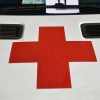Finland has taken a much stricter approach to Covid-19 restrictions than Sweden
Credit: Lehtikuva/Markku Ulander/Reuters
Sweden may be forced to seek emergency help from Finland, Norway, or Denmark, as its hospitals struggle to cope with the number of coronavirus patients, a senior doctor has warned.
Sten Rubertsson, a doctor working for the Swedish Board of Health and Welfare, said he expected Sweden’s 21 regions to release a coordinated plan to increase the number of available intensive care places "within days", ahead of the coming Christmas peak. "It’s not going in a positive direction – it’s actually escalating – and if we reach a situation where we cannot handle this ourselves, we will definitely ask our brother and sister countries for assistance," he told The Telegraph.
The plan came after Stockholm region on Wednesday called for help from national agencies, warning that 99 percent of its intensive care places had been filled on Tuesday.
Sweden’s per-capita death rate last week rose above 50 per 100,000 for the first time since the end of May, according to ECDC figures.
"We are in an extremely serious situation right now and we need help," Stockholm’s health director Björn Eriksson said in a press conference.
Sweden has not locked down in the way that its neighbours have
Credit: Jonas Gratzer/Getty Images Europe
He said the region had submitted a formal request to the National Board of Health and Welfare, which coordinates healthcare between Sweden’s regions, calling for it, in turn, to seek help from the Swedish Armed Forces.
Sweden doubled its number of intensive care places in the spring to 1,100, in one of the country’s most impressive achievements of the pandemic.
This meant that spare capacity never dropped below 30 percent, even when hospitalisations hit their April peak. But the extra capacity was wound down over the summer, with a huge field hospital in southern Stockholm dismantled without ever being used.
The country now has only 673 intensive care places, 82 percent of which are full, with more than 90 percent of places full in each of the four worst-hit regions.
At the same time, the onset of winter has increased the number of people needing intensive care for other emergencies. Stockholm was suffering from a shortage of trained doctors and nurses rather than beds or equipment, he stressed. But Johanna Sandvall, the board’s crisis chief, said it was not easy to dispatch armed forces medical personnel, as most were reserve officers already at hospitals elsewhere.
"These are personnel who already work as nurses or doctors in a region, but if we were used the reserve officer system so that the Armed Forces just call in reserves and place them somewhere, we would just be creating a hole that the regions can’t control," she said.
Rubertsson said there was "nothing strange" in requesting that other Nordic countries take patients or send personnel or equipment, saying that the most challenging patients are already frequently exchanged between the countries, with his own Uppsala region sending burns patients to Norway and neonatal patients to Finland.
"During the peak of our problems in the spring, we got offers from our neighbours, saying that they were willing to help us if we ended up in a situation where we couldn’t make sure all the patients are safe," he said.






















































Свежие комментарии